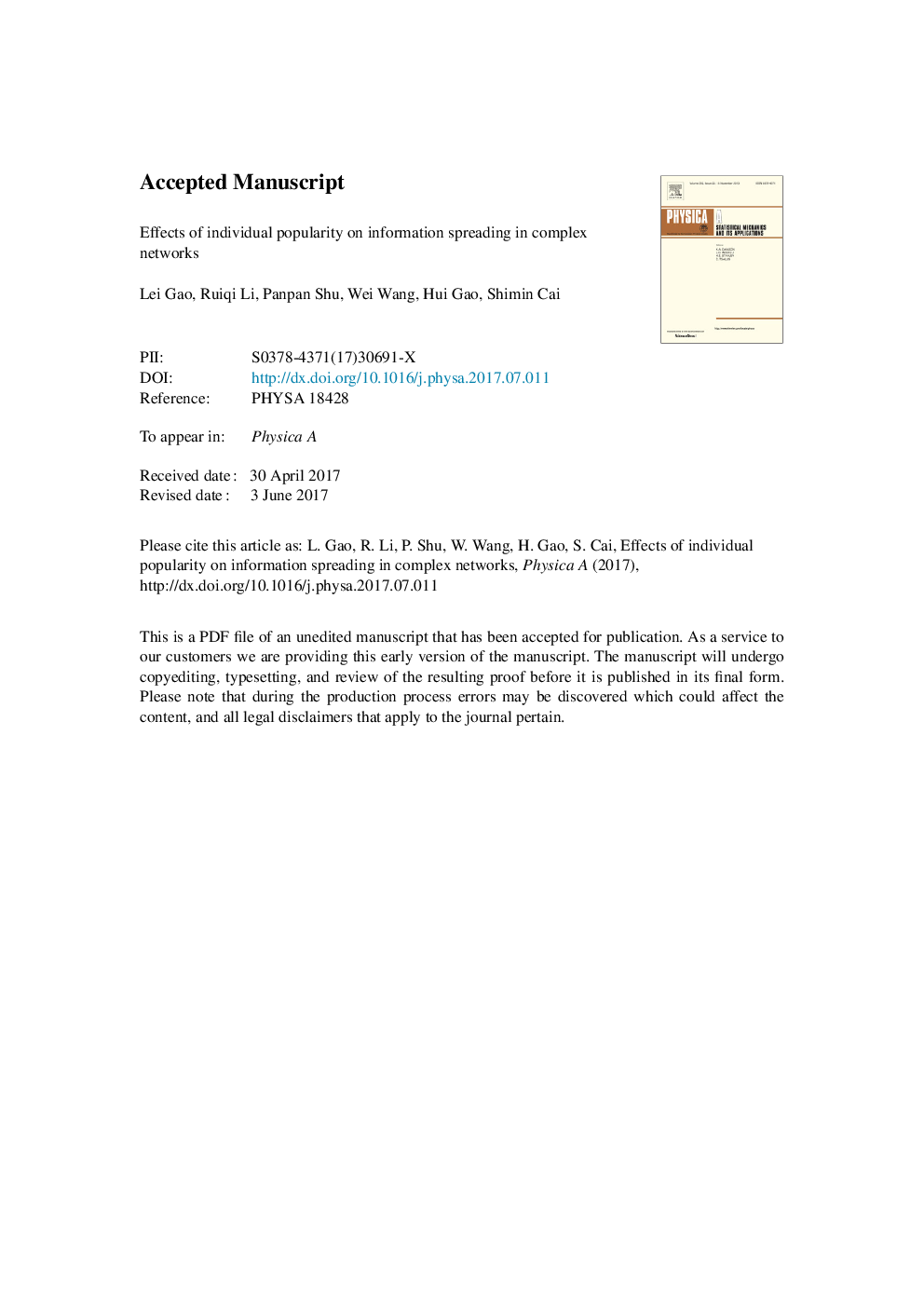| کد مقاله | کد نشریه | سال انتشار | مقاله انگلیسی | نسخه تمام متن |
|---|---|---|---|---|
| 5102663 | 1480084 | 2018 | 19 صفحه PDF | دانلود رایگان |
عنوان انگلیسی مقاله ISI
Effects of individual popularity on information spreading in complex networks
ترجمه فارسی عنوان
تاثیر محبوبیت فرد بر گسترش اطلاعات در شبکه های پیچیده
دانلود مقاله + سفارش ترجمه
دانلود مقاله ISI انگلیسی
رایگان برای ایرانیان
کلمات کلیدی
شبکه های پیچیده گسترش پویایی، گسترش اطلاعات،
ترجمه چکیده
در دنیای واقعی، فعالیت های انسانی اغلب مکانیزم انتخاب ترجیحی را بر اساس محبوبیت افراد نشان می دهد. با این وجود، مطالعات قبلی در مورد گسترش پویایی شبکه ها، این سازوکار را به ندرت مورد توجه قرار می دهد. بنابراین در این کار، یک مدل گسترش اطلاعات با توجه به انتخاب ترجیحی بر اساس محبوبیت فعلی افراد، که به عنوان تعداد مخاطبین تجمعی افراد با همسایگان متبوع تعریف شده است، پیشنهاد می شود. یک نظریه میانگین میدان برای تجزیه و تحلیل مدل گسترش است. از طریق بررسی سیستماتیک گسترش پویایی اطلاعات در شبکه های پیکربندی پیچیده و همچنین شبکه های دنیای واقعی، متوجه می شویم که اولویت محبوبیت تاثیر زیادی بر گسترش اطلاعات دارد. از یک طرف، گسترش اطلاعات تسهیل شده است، به عنوان مثال، شیوع نهایی بیشتر اطلاعات و یک آستانه شیوع کوچکتر، اگر گره های با محبوبیت کم انتخاب ترجیحا انتخاب شوند. در این وضعیت، ارتباط موثر میان گره های آگاه و گره های حساس افزایش می یابد و گره های تقریبا یکسان احتمال دریافت اطلاعات را دارند. از سوی دیگر، اگر گره های با محبوبیت بالا انتخاب شده ترجیح داده شود، شیوع نهایی اطلاعات کاهش می یابد، آستانه شیوع افزایش می یابد، و حتی این اطلاعات نمی تواند شیوع یابد. علاوه بر این، ناهمگونی توزیع درجه و ساختار شبکه های دنیای واقعی بر کیفیت نتایج کیفی ندارد. تحقیقات ما می تواند برخی از حمایت های نظری را برای ارتقاء گسترش مانند اطلاعات، رفتارهای بهداشتی، و محصولات جدید و غیره فراهم کند.
موضوعات مرتبط
مهندسی و علوم پایه
ریاضیات
فیزیک ریاضی
چکیده انگلیسی
In real world, human activities often exhibit preferential selection mechanism based on the popularity of individuals. However, this mechanism is seldom taken into account by previous studies about spreading dynamics on networks. Thus in this work, an information spreading model is proposed by considering the preferential selection based on individuals' current popularity, which is defined as the number of individuals' cumulative contacts with informed neighbors. A mean-field theory is developed to analyze the spreading model. Through systematically studying the information spreading dynamics on uncorrelated configuration networks as well as real-world networks, we find that the popularity preference has great impacts on the information spreading. On the one hand, the information spreading is facilitated, i.e., a larger final prevalence of information and a smaller outbreak threshold, if nodes with low popularity are preferentially selected. In this situation, the effective contacts between informed nodes and susceptible nodes are increased, and nodes almost have uniform probabilities of obtaining the information. On the other hand, if nodes with high popularity are preferentially selected, the final prevalence of information is reduced, the outbreak threshold is increased, and even the information cannot outbreak. In addition, the heterogeneity of the degree distribution and the structure of real-world networks do not qualitatively affect the results. Our research can provide some theoretical supports for the promotion of spreading such as information, health related behaviors, and new products, etc.
ناشر
Database: Elsevier - ScienceDirect (ساینس دایرکت)
Journal: Physica A: Statistical Mechanics and its Applications - Volume 489, 1 January 2018, Pages 32-39
Journal: Physica A: Statistical Mechanics and its Applications - Volume 489, 1 January 2018, Pages 32-39
نویسندگان
Lei Gao, Ruiqi Li, Panpan Shu, Wei Wang, Hui Gao, Shimin Cai,
